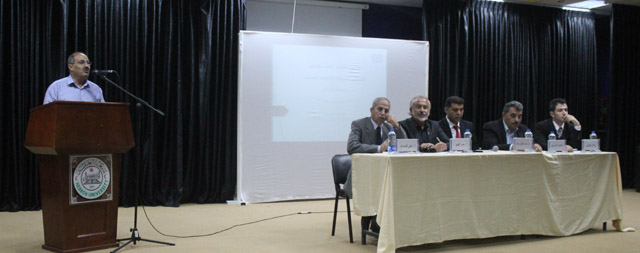News Archive
Hebron University Inaugurates the First Labor Law Clinic in Palestine
The College of Law and Political Science at Hebron University, through its legal clinics and in cooperation with the Palestinian Ministry of Labour and the International Labor Organization (ILO), launched the first specialized legal clinic in labor law in Palestine. This clinic incorporates this academic semester 11 students who work towards ensuring the application of labor law in areas such as the minimum wage, insurance for workers against work injury, child labor, end of service indemnity for workers, and raising the awareness of workers and employers on labor rights.
The launch of this specialized clinic came through a seminar organized by the College and its legal clinics. The seminar was opened by Dr. Sami Adwan, Vice President for Academic Affairs, who welcomed the guests and noted the importance of labor law in the achievement of social justice. The following persons spoke at the seminar: Mr. Munir Klaibo, ILO Representative in Palestine, Mr. Ali Kadimat, Director General of the Ministry of Labor Branch in Hebron, Mr. Mahmoud Darawish who is in Charge of the Inspection Department at the Palestinian Ministry of Labor, Mr. Bilal Fanoun, Lecturer at the College of Law and Political Science. The seminar was moderated by Dr. Bassam Qawasmeh, Professor of Law at Hebron University. Some 150 persons took part in the seminar, including students, professors, lawyers, human rights activists, journalists and government officials.
At the end of the seminar, participants recommended the following actions:
- Adopting a law on social security for workers in Palestine.
- Harmonizing Palestinian legislation and policies in line with international labor standards, especially those on child labor, persons with disabilities, gender equality, working hours, and holidays/vacations.
- Increasing the number of labor inspectors in various Palestinian districts.
- Working on the Palestine's membership in the ILO and accession to international conventions relating to the right to work.
- Establishing specialized courts on labor cases.
- Increasing the awareness among workers and employers and the potential contribution of law students, through specialized legal clinics, in monitoring the application of labor law and raising community awareness on it.







